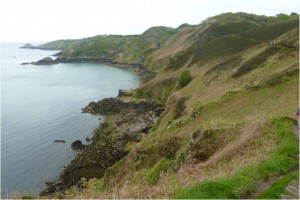In this post:
– Working as an agent in the 18th century: Tasks and Methods
– Deadly Dangers
– A Thorn in Napoleon’s Side
Angelique Le Tourneur was a spy. She looked like an ordinary fisherwoman, and her little boat sailing from village to village along the French coast was loaded with fish. But Angelique belonged to a network of spies that was operated from the Isle of Jersey for 18 years.
The network was called “La Correspondance”. The spymaster was Philipp D’Auvergne (1754 – 1816), his headquarters were at Jersey. “La Correspondance” was a section of the British secret service that operated in the western area of France. Its mission was to bring the King of France back to the French throne.
Working as an agent: Tasks and Methods
The members of “La Correspondance” had different tasks. Some of them, like Angelique Le Tourneur, transported messages. Let’s have a closer look at Angelique’s boat: Besides the fish, she often had a secret parcel hidden on board. She delivered them to one Madame de Clinchamp. Madame Clinchamp passed the information on to the next agent.

The wild coast of the Isle of Jersey – the perfect location for smuggling and espionage…. (photo by Lady Dorothy)
Other members of “La Correspondance” ran confidential houses where agents trying to get to Jersey could find a hiding place. A secret and safe hideout was immensely important. Even though about 300 persons worked for or sympathised with D’Auvergne, Brittany was a dangerous place for an agent: The major part of the population was hostile, and French patrols were constantly on guard. Agents waiting at the coast for a boat to ferry them to Jersey were highly exposed to danger. Once, agent Armand de Chateaubriand and his companion were cornered while trying to deliver a report for D’Auvergne. De Chateaubriand swallowed the letter he carried and ran for his life. Read his report about his flight here:
“I (…) jumped over a deep ditch. I preferred death to surrender. They fired a volley, but I was fortunate enough not to be hit. (…) The country round was open; there were no hiding-places but I had a start and I kept it, and at last managed to reach a wood (…). By this time I was utterly exhausted. I had just strength enough left to force my way through the thick undergrowth with my carbine.”(1)
Another method of transporting reports from France to Jersey was to place them in pre-arranged caches in the rocks along the French coast. Boats from Jersey would come by night to pick them up.
Vigilance and Discretion
The members of “La Correspondance” knew each other only by pseudonym, such as Le Vigoreux, Petit Philippe, Fidelis, L‘Anonym, and L’Eremit. Angelique’s pseudonym was Pipette.
The agents were careful to hide their reports from enemies’ eyes, writing with a white fluid on white paper. When this kind of invisible ink was not at hand, the agents used code words taken from botany, cooking, music and tailoring.
Deadly Dangers
Espionage has always been a dangerous business: Pipette and Madame Clinchamp were eventually arrested. Their fate is unknown, but espionage was usually punished with prison or death. Armand de Chateaubriand – the agent who had swallowed his letter – had been lucky to escape. De Chateaubriand reports:
“The soldiers by good luck did not find my hiding-place, only one of the dogs did, but seeing my gun, thought I was engaged in sport, and sniffed at it and went away.” (1)
De Chateaubriand’s companion was less fortunate: He was captured and shot.
Many of D’Auvergne’s agents died or were captured on their missions. D’Auvergne arranged allowances for the injured agents and pensions for the bereaved.
A Thorn in Napoleon’s Side
Napoleon was annoyed by the work of D’Auvergne’s spy network and the eagerness of the population of Jersey to fight France: “France can no longer tolerate this nest of brigands”, he raged in 1804 in an article in ‘Gazette Nationale ou Le Moniteur Universal’, one of the newspapers he controlled. “Jersey is England’s disgrace!”
Make the Isle of Jersey a Setting of Your Regency Novel
The Isle of Jersey is an ideal setting for a historical novel featuring both romance and adventure. A hero might travel to Jersey to play his part in defending England by joining D’Auvergne’s smugglers or agents. As women had been involved in “La Correspondance”, your heroine can be on the lookout for an adventure as well. But instead, she could be a lady coming to the island to visit distant relatives, or even a governess seeking employment in one of the schools D’Auvergne had set up for the French émigrés. About 3000 émigrés had fled to Jersey during the French terror, and D’Auvergne cared for them.
Here are more facts about the secret service activities operated from Jersey:
- D’Auvergne provided a group of French Royalists fighting Napoleon with arms, ammunition and medical supplies. Regularly, those supplies were landed on the French coast at night and then smuggled through the patrols.
- England tried to weaken Napoleonic France by destabilizing its economy. English paper-mills produced fake French paper money. The money was smuggled to France by Jersey boatmen.
- Privateering was another form of economic warfare: The English Crown had licensed Jersey ship-owners to attack French ships and keep the profits from any prize captured. Many merchants took on this sideline job. Thus, many fortunes in Jersey are founded on privateering.
- The Royalists in France plotted to kidnap Napoleon, and it is said that D’Auvergne supported them. The plan was to imprison Napoleon at Mont Orgueil Castle on Jersey under the control of D’Auvergne. The plan, however, failed.
- “La Correspondance” was most effective in the 1790ies. To reward his agents, D’Auvergne received £15,747 from the British Government in 1796.
- The spy network eventually was infiltrated by double agents. As a consequence, many of D’Auvergne spies were captured and the confidential houses in France were detected. In 1808, the network was betrayed by Noel Prigent, a senior member of “La Correspondance”.
Sources
(1) Herpin E. / Colquhoun Grant, Mrs.: The hero of Brittany. Armand de Chateaubriand; Mills & Boon’s, 1914.
Ashelford, Jane: In the English Service. The Life of Philippe D’Auvergne”, Jersey Heritage Trust, 2008.
Balleine, George Reginald (Author) / Syvret, M. (Editor) / Stevens, J. (Editor): Balleine’s History of Jersey; Phillimore & Co Ltd. 1981.
Sinsoilliez, Robert: Les espions du roi; Franck Martin: 2006.
Click here for more posts of the “Writer’s Travel Guide”-Series.
Article by Anna M. Thane, author of the novel
“Von tadellosem Ruf” (http://amzn.to/2TXvrez)


